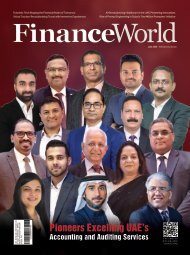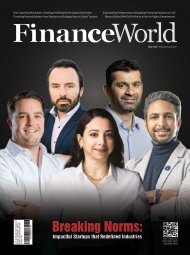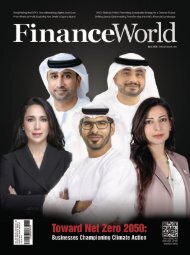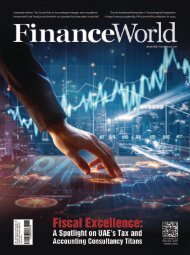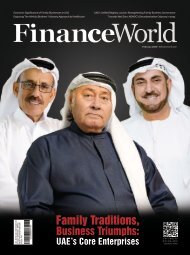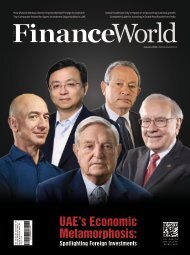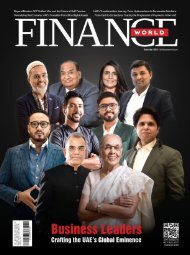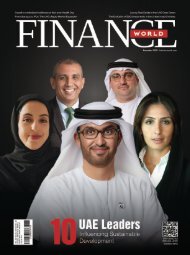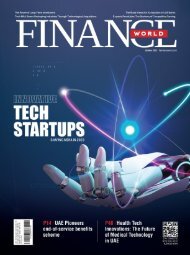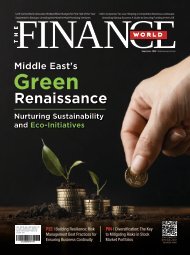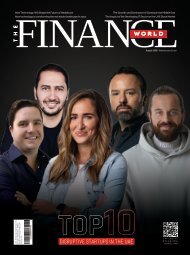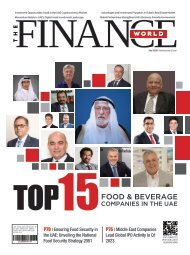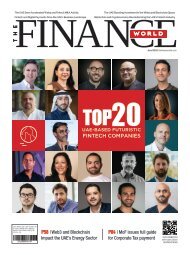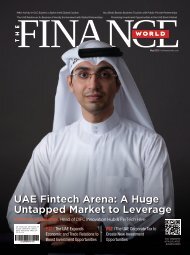The Finance World Magazine| Edition: April 2023
The April edition of The Finance World Magazine (TFW) delves into the world of disruptive investment and its potential to transform markets, featuring an exclusive interview with Hadif Abdullah Zamzam, Senior Associate – Value Creation, Disruptive Investments at Mubadala, who shares his insights on this topic. In addition, we feature interviews with prominent CEOs, including Nilay Ranjan Singh of State Bank India, DIFC, Raman Thiagarajan, CEO & Founder of Zenda, and Naveen Bharadwaj, Group CEO of Trescon. They provide valuable insights on various topics related to business and investments, particularly in the fintech area. Through this edition, we also bring you insights on topics like the UAE and Turkey CEPA agreement that sets the ground for novel business opportunities, cryptocurrency adoption in the UAE and how it is expected to disrupt trade and payment systems, buying and selling properties in Dubai and strategies to boost profitability, and many more articles that offer critical analysis and insights on current trends and issues in the business and investment domains. Keep yourself up to date with all financial sector news with our current news segments. Each person can find something unique from us. We believe our readers deserve real value from what we have to offer.
The April edition of The Finance World Magazine (TFW) delves into the world of disruptive investment and its potential to transform markets, featuring an exclusive interview with Hadif Abdullah Zamzam, Senior Associate – Value Creation, Disruptive Investments at Mubadala, who shares his insights on this topic.
In addition, we feature interviews with prominent CEOs, including Nilay Ranjan Singh of State Bank India, DIFC, Raman Thiagarajan, CEO & Founder of Zenda, and Naveen Bharadwaj, Group CEO of Trescon. They provide valuable insights on various topics related to business and investments, particularly in the fintech area.
Through this edition, we also bring you insights on topics like the UAE and Turkey CEPA agreement that sets the ground for novel business opportunities, cryptocurrency adoption in the UAE and how it is expected to disrupt trade and payment systems, buying and selling properties in Dubai and strategies to boost profitability, and many more articles that offer critical analysis and insights on current trends and issues in the business and investment domains.
Keep yourself up to date with all financial sector news with our current news segments. Each person can find something unique from us. We believe our readers deserve real value from what we have to offer.
Create successful ePaper yourself
Turn your PDF publications into a flip-book with our unique Google optimized e-Paper software.
Cover Story<br />
Industries<br />
slow to adopt<br />
tech or meet<br />
consumer<br />
needs are<br />
at risk of<br />
disruption by<br />
companies<br />
that bridge the<br />
gap and solve<br />
consumer<br />
pain-points.<br />
business case for the “theory” behind<br />
an investment.<br />
When it comes to putting theory in<br />
practice, though, there is no step more<br />
important than the assessment of the<br />
management team and their business<br />
model. This involves assessing the<br />
experience and track record of the<br />
management team, as well as the<br />
potential for scalability and profitability<br />
of the business model.<br />
Q. Could you describe a project<br />
or initiative you are particularly<br />
proud of in your work at Mubadala,<br />
and how your skills and experience<br />
were instrumental in its success?<br />
Hadif Zamzam: One project that I<br />
am particularly proud of during my time<br />
at Mubadala was when I was part of<br />
the Healthcare Unit and helped create<br />
a program to ensure the continuity of<br />
medical care for at-risk, chronically ill,<br />
and elderly patients in the emirate of<br />
Abu Dhabi during the early stages of full<br />
lockdown during the Covid Pandemic.<br />
As someone who has more diabetic<br />
family members than I can count,<br />
this project was especially fulfilling<br />
for me. Despite not being a medical<br />
professional, my skills and experience<br />
were instrumental in the success of<br />
this initiative. I worked closely with<br />
multiple stakeholders, including<br />
healthcare providers, insurers, and<br />
government agencies, to ensure that<br />
patients received the care they needed<br />
during a time of crisis.<br />
I am proud to say that the program<br />
was adopted by the Department of<br />
Health in Abu Dhabi and ensured that<br />
even in the midst of a global pandemic,<br />
care was being delivered to those<br />
who needed it most. Knowing that I<br />
played a role in improving the lives<br />
of vulnerable individuals and families<br />
during a difficult time is one of my most<br />
rewarding experiences at Mubadala.<br />
Q. Could you describe a project<br />
or initiative you are particularly<br />
proud of in your work at Mubadala,<br />
and how your skills and experience<br />
were instrumental in its success?<br />
Hadif Zamzam: One project that I<br />
am particularly proud of during my time<br />
at Mubadala was when I was part of<br />
the Healthcare Unit and helped create<br />
a program to ensure the continuity of<br />
medical care for at-risk, chronically ill,<br />
and elderly patients in the emirate of<br />
Abu Dhabi during the early stages of full<br />
lockdown during the Covid Pandemic.<br />
As someone who has more diabetic<br />
family members than I can count,<br />
this project was especially fulfilling<br />
for me. Despite not being a medical<br />
professional, my skills and experience<br />
were instrumental in the success of<br />
this initiative. I worked closely with<br />
multiple stakeholders, including<br />
healthcare providers, insurers, and<br />
government agencies, to ensure that<br />
patients received the care they needed<br />
during a time of crisis.<br />
I am proud to say that the program<br />
was adopted by the Department of<br />
Health in Abu Dhabi and ensured that<br />
even in the midst of a global pandemic,<br />
care was being delivered to those<br />
who needed it most. Knowing that I<br />
played a role in improving the lives<br />
of vulnerable individuals and families<br />
during a difficult time is one of my most<br />
rewarding experiences at Mubadala.<br />
Q. What are some of the main<br />
challenges or risks associated<br />
with disruptive investment, and<br />
how can we mitigate these risks?<br />
Hadif Zamzam: Disruptive<br />
investments are often made in<br />
emerging technologies or new markets<br />
that are untested, and they rely on<br />
emerging technologies that are still in<br />
development. This means that there is<br />
a risk that the market will not develop<br />
as expected, or the technology may<br />
not work as expected. To mitigate<br />
this risk, investors should conduct<br />
thorough market research and assess<br />
the potential demand for the technology<br />
or innovation as well as the strength of<br />
the company’s development team. <strong>The</strong>re<br />
is also a risk that, after investments<br />
have been made, the management team<br />
may not be able to execute on the plan<br />
or that the plan may not be successful,<br />
which is another reason it is important<br />
to place a huge emphasis on getting<br />
familiar with the management team<br />
and their ability to make it out of a<br />
tough situation.<br />
Q. What makes industries ripe for<br />
disruption and how do you identify<br />
potential investment opportunities<br />
based on these characteristics?<br />
Hadif Zamzam: While there is no<br />
clear-cut method, there are some<br />
symptoms an investor can look out<br />
for. Industries that have been slow<br />
to adopt new technologies or have<br />
not kept up with changing consumer<br />
needs are inherently at risk of being<br />
disrupted by companies that find a<br />
way to bridge the gap and address a<br />
consumer pain-point. Another sign is<br />
an industry which has, historically,<br />
had high barriers to entry, and is made<br />
up of a handful of large players with<br />
significant market power. Small startups<br />
with significantly higher levels of<br />
30 www.thefinanceworld.com <strong>April</strong> <strong>2023</strong>




